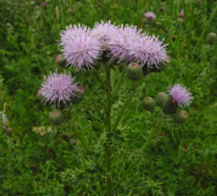Volume 10, Issue 02
May 2007
bulletin
français

| Subscription information If you would like to subscribe, have any questions or if would like to contribute a news item, please contact Yann Vergriete, newsletter editor or David Gailbraith, CBCN executive director: yannvergriete@fastmail.fm dgalbraith@rbg.ca |
|
9. Stopping the Green Invasion! Memorial University of Newfoundland Botanical Garden Takes Aim at Invasive Alien Species, Costa Kasimos & Joy Barfoot, MUN Botanical Garden
If you’ve ever driven onto one of the ferries leaving Newfoundland, you’ve probably been pleasantly surprised by the complimentary car wash…until you see that they only cleaned the bottom of your car. This is but one of many programs across the country designed to prevent the spread of invasive alien species; in this case the Golden Nematode (a potato disease). Canada, as well as most other countries, has been forced to deal with the multi-billion dollar problems associated with alien species. Invasive alien species are one of the world’s most serious threats to biodiversity and they can have massive economic consequences as well. They include plants, animals and microbes that can enter natural habitats, become established, and out-compete native species. If they simply stayed in one area, they would be regarded as exotic species. It is when they start changing things, spreading around, squeezing out natives that they are considered an unwanted pest (or alien invasive). Canada, through the Canadian Food Inspection Agency and Environment Canada, has become very active in this field. With such delights as the Asian long-horn beetle, sudden oak death, Dutch elm disease, purple loosestrife, West Nile virus, and Japanese beetle well into Canada, and bearing down on our province, you can be pretty sure that regulations are only going to get tougher. Let’s just focus on plants; there are almost 4,000 species of plants in Canada, 800 of which are non-native or alien. Newfoundland and Labrador’s climate, and Newfoundland’s isolation as an island, has limited the extent of the problems caused by invasive alien species. However, over 35% of our plant species are alien…that’s 1 in 3! So who invited these unwanted guests? The answer, unfortunately, is us. Many common alien plants taste good (to us or our farm animals) or look good, so were intentionally brought here for our benefit. Some aliens snuck in, hidden away in bags of livestock feed, and even the guts of livestock. Still others arrived as packing material, medicinals, hay crops and, of course, ornamentals. Nowadays, with the advent of the Internet, plant enthusiasts can now purchase plants from all over the world. While there are plenty of weedy aliens that cause headaches for gardeners, it is the aliens that threaten Newfoundland and Labrador’s natural ecosystems that Joy Barfoot and Costa Kasimos of the MUN Botanical Garden are most interested in. With funding from the Invasive Alien Species Partnership Program, Joy and Costa are creating an awareness campaign to help stop the spread of invasive alien plants, prevent any future invasives from entering our fragile ecosystems, and manage those that are here to stay. The education campaign will encourage people to learn about new garden species before they plant them. The importance of buying from local nurseries and avoiding sneaking plants and plant materials into the country will be emphasized. Using native plants as ornamental plants will be promoted as an ecological alternative. The use of native plants for landscaping not only prevents alien plants from being introduced but also reduces the use of pesticides and fertilizers. The campaign will teach people how to prevent the introduction of new plants into natural habitats by using gardening techniques, such as proper composting of garden wastes. A web-based monitoring program (www.mun.ca/botgarden) was launched during the “Eyes Across the Province” workshop, held at the Garden on April 17th. The goal of this monitoring program is to encourage outdoor enthusiasts and nature lovers to report sightings of “green aliens” from across Newfoundland and Labrador. Since the launch, several volunteers have already reported sightings of coltsfoot from various regions of the province. Gardening is an enriching and rewarding pastime and MUN Botanical Garden encourages everyone to participate in and experience this activity. The intention of the campaign is not to take away our garden plants. Far from it; the hope is that we will expand interest in gardening activities with a heightened appreciation for the natural environment around us. In the meantime, as the last winter snowflake quietly seeps into the soil, and the longing for springtime sunshine rises from the shadow, keep a “watchful eye” and happy gardening!
|


